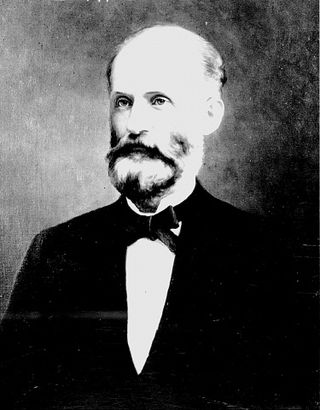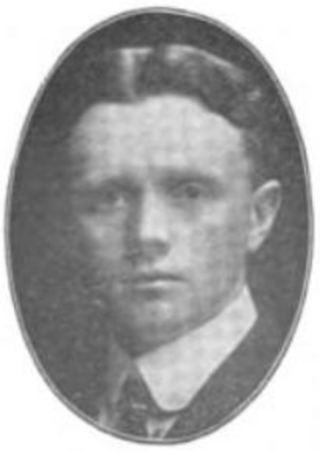Related Research Articles

William E. Smith was an American merchant and politician who served as the 14th Governor of Wisconsin, the 5th State Treasurer of Wisconsin, and the 21st Speaker of the Wisconsin State Assembly. He also served four years in the Wisconsin State Senate, representing Dodge County. In business, he was the co-founder of Smith, Roundy & Co., which became the supermarket chain Roundy's.

Samuel S. Fifield was a Wisconsin politician and influential businessperson. The Town of Fifield in Price County, Wisconsin is named after him.

The Speaker of the Wisconsin State Assembly is the presiding officer of the Wisconsin State Assembly, the lower house of the Wisconsin Legislature. Article IV of the Constitution of Wisconsin, ratified in 1848, establishes the legislature and specifies the election of officers. The role and responsibilities of the speaker are defined in the Assembly Rules, originally in Rule 1, and also, under the present rules, Rule 3.
Joseph J. Czarnezki is an American politician and public administrator from Milwaukee, Wisconsin. He served briefly as a member of the Wisconsin Elections Commission, appointed by Governor Tony Evers in May 2023, his appointment was rejected by the Wisconsin Senate in October 2023, due to a controversy over the reappointment of state elections administrator Meagan Wolfe. Czarnezki previously served ten years in the Wisconsin Senate and two years in the State Assembly, representing western Milwaukee County. He also led several city departments under Milwaukee mayor John O. Norquist, served eight years as county clerk, and was a member of the Milwaukee County board of supervisors.

The First Wisconsin Legislature convened from June 5, 1848, to August 21, 1848, in regular session. Members of the Assembly and Senate were elected after an election on February 1, 1848, that ratified the proposed state constitution.

Edward H. Kiefer was an American house painter who served seven terms as a member of the Wisconsin State Assembly representing Milwaukee. He ran initially as a Socialist, then became a Progressive.

George F. L. Hampel, Sr., was an American politician, accountant and bookseller from Milwaukee who served one term in the Wisconsin State Assembly as a Socialist (1931–1932) and two terms in the Wisconsin State Senate as a Progressive (1937–1944). Hampel at various times identified himself as a Social Democrat/Socialist, and Progressive; and joined the Republicans when the Progressives rejoined the latter party.

Peter F. Leuch was an American lawyer from Milwaukee who served as that city's city clerk, and served one term as a Republican member of the Wisconsin State Assembly.

Edward H. Zinn was an American mechanical engineer, tax assessment clerk and Socialist from Milwaukee, Wisconsin who served two terms (1913–1916) as a member of the Wisconsin State Assembly representing the 7th Milwaukee County Assembly district (7th and 10th wards of the city of Milwaukee.
William A. Schmidt was an American welder and shop foreman who served two terms as a Democratic member of the Wisconsin State Senate from the Sixth District.

The Second Wisconsin Legislature convened from January 10, 1849, to April 2, 1849, in regular session. Senators representing odd numbered districts were newly elected for this session and were serving the first year of a two-year term. Senators representing even numbered districts were serving the second year of their two-year term.

The Third Wisconsin Legislature convened from January 9, 1850, to February 11, 1850, in regular session. Senators representing even numbered districts were newly elected for this session and were serving the first year of a two-year term. Senators representing odd numbered districts were serving the second year of their two-year term.
The Twelfth Wisconsin Legislature convened from January 12, 1859, to March 21, 1859, in regular session.
The Thirteenth Wisconsin Legislature convened from January 11, 1860, to April 2, 1860, in regular session.

The Thirty-Second Wisconsin Legislature convened from January 8, 1879, to March 5, 1879, in regular session.

The Thirty-Third Wisconsin Legislature convened from January 14, 1880, to March 17, 1880, in regular session.

The Thirty-Eighth Wisconsin Legislature convened from January 12, 1887, to April 15, 1887, in regular session.

The Fortieth Wisconsin Legislature convened from January 14, 1891, to April 25, 1891, in regular session. They met again for two special sessions in June 1892 and October 1892 to pass redistricting laws. The extra sessions were necessitated by court cases which threw out the Legislature's previous attempts at redistricting. The final redistricting act was signed just 12 days before the 1892 general election.

The Forty-Second Wisconsin Legislature convened from January 9, 1895, to April 20, 1895, in regular session. They convened again in special session in February 1896 to pass a legislative redistricting law.

The Forty-Fourth Wisconsin Legislature convened from January 11, 1899, to May 4, 1899, in regular session.
References
- ↑ The Wisconsin Blue Book. 1948. p. 62. Retrieved 2018-05-06.
- ↑ Lawrence S. Barish, ed. (2007). State of Wisconsin Blue Book. p. 149.